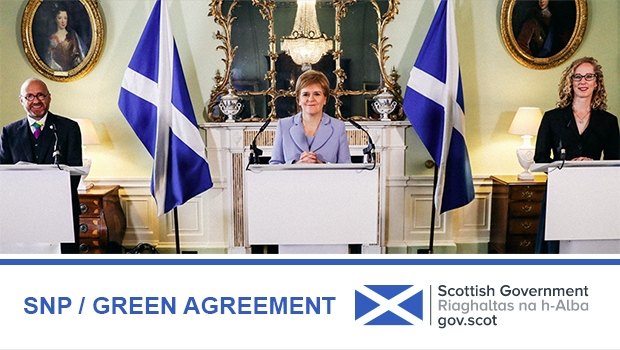
The decision by the Scottish National Party and the Scottish Green Party to enter into a co-operation agreement has seen a predictably furious backlash from ardent British unionists, taking aim from their assorted political parties and media outlets. The most hilarious of the day and the one that has been rightly mocked (to the point that he trended on Twitter) was Andrew Neil who wrote a scathing article in the Daily Mail deriding the Scottish greens for being “Anti-Monarchy. Anti-Britain, Anti-Wealth” and “Eco-zealot Marxists”.
Ahh Mr BBC balance himself, Andrew Neil. pic.twitter.com/GCfw0lpZNI
— Femi (@Femi_Sorry) August 28, 2021
From the completely hyperbolic to the wrong-headed and ridiculous, with Murdo Fraser complaining “Looks like we just got the Government that we didn’t vote for” despite the fact that the combined votes of the SNP and Green voters come closer to representing the views of the Scottish people than being represented in Westminster by a Tory government overwhelmingly rejected at the ballot box in Scotland with only 25% of the vote. The Conservatives haven’t won in Scotland since 1955, before mankind first went to the moon.
Anas Sarwar, the leader of the Labour branch office in Scotland also chimed in and seemed to suggest a pan-unionist coalition, when he said “Let’s build an alternative” and criticised the focus on the constitution. What Labour don’t seem to understand, or perhaps desperately don’t want to understand, is that until Scotland is independent, we will never have what could be described as “normal” politics. Although it doesn’t suit them, the movement and momentum for independence is here to stay and will continue to influence the fortunes of all political parties, and none so much as theirs, where they are doomed to be nothing more than the unionist bridesmaids to the Tory bride.
The agreement between the SNP and the Greens was overwhelmingly welcomed and endorsed by the members of each party and will see Patrick Harvie and Lorna Slater enter Government and make history by becoming the first Green politicians to hold Ministerial positions in either Scotland or the UK. Having Greens involved in Government is a mainstream European position, Greens are minority partners in Government in Sweden, Austria, Finland, Luxembourg, Belgium, Republic of Ireland, North Macedonia and Montenegro. It is a further move away from the highly flawed politics of the UK Parliament with it’s two-party hegemony and unelected upper house.
When the SNP were first elected in 2007 as a minority government, with just one more seat than Labour, nobody expected them to be able to last for the full term but it was a tribute to the mastery of their business and finance teams that they managed to find common cause with various parties to fund policy commitments drawn from across the political spectrum, securing budget support and therefore continued Government on that basis. This was actually when some of the most radical changes of the SNP’s term in Government were introduced and many of the achievements they still mention as touchstone policy implementations are from that term of Government.
In recent years, the SNP hasn’t adopted quite as many radical policies, nothing with quite the political “oomph” and life-changing impact of free prescriptions or abolition of tuition fees, instead developing more of a managerial style, being a safe pair of hands and slowly trying to make life better for the people of Scotland through things like the Scottish Child Payment and abolishing dental charges for under 25s. They have had their hands tied by events to a certain extent but after fourteen years in Government it is not surprised that their offering is looking a little tired. The deal with the Greens offers fresh impetus for radical policy development and the commitments in the agreement give a taster of how that could look.
The main reason to believe this development is an overwhelmingly positive one in Scottish politics is that it underscores that above anything else, there is a pro-independence majority at Holyrood and as such it will give an unstoppable impetus toward the second independence referendum. The UK is beginning to flounder profoundly in a Brexit mess of it’s own, but crucially not Scotland’s making, and Scotland wants out. No matter how the unionist politicians shout, bluster, grit their teeth and try to move the goalposts, it is clear that this agreement brings us that much closer to achieving not just a referendum opportunity but independence itself, within the term of the current Scottish Parliament.
Steven Marwick is a freelance content writer based in Scotland. If you enjoy his work, he is available to hire on the Upwork freelancer portal. Alternatively, you can buy him a coffee on Ko-fi.
Comments Closed